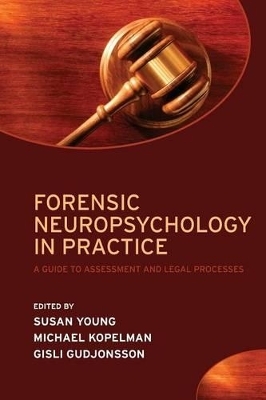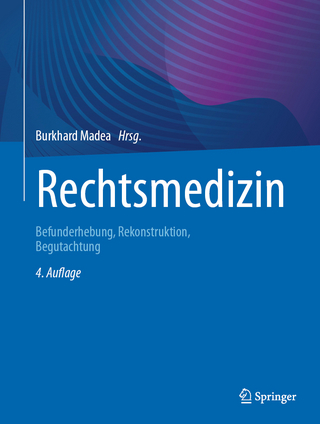
Forensic Neuropsychology in Practice
Oxford University Press (Verlag)
978-0-19-856683-0 (ISBN)
Clinical psychologists and psychiatrists are increasingly being asked to prepare reports for legal purposes. These might involve issues regarding the clients own mental state at the time they committed the crime, or it might involve the neuropsychological effects of an injury to a third party. In addition they might be looking at issues regarding impulsivity, and the role of underlying disorders such as ADHD, and antisocial or borderline personality disorders. These topics are typically the preserve of the field of forensic neuropsychology, yet for many, this discipline is seen as a highly specialised one beyond the scope and skill of the clinical psychologist.
This book fills a major gap in the literature, in providing a practical reference text for clinical and forensic psychologists and psychiatrists who are working in these important areas of forensic consultancy, and who need a working knowledge of neuropsychological assessment and legal processes. Topics include: aggression and violence, learning disability and developmental disorders - such as autism and ADHD, eplilepsy, amnesia, alcohol and substance misuse, and traumatic head injury. In addition, the book looks at expert testimony, malingering, and other ethical and professional issues. It will help practitioners deal with the clinical and neuropsychological problems in the field, and negotiate the legal labyrinths involved in issues such as competency, fitness to plead and stand trial, mental capacity and mitigation.
With chapters written by leading practitioners and clinicians that provide a synthesis of key knowledge and best practice in their areas, this thought provoking and pragmatic guide will be essential for clinical and forensic neuropsychologists, psychiatrists, and lawyers.
Suzy Young is Programme Leader of the Institute of Psychiatry's MSc. in Clinical Forensic Psychology and an Honorary Consultant Clinical Psychologist at Broadmoor Hospital. She has served as an expert witness in a number of high profile legal cases, including the Jill Dando case, the Billy Joe Friend case, the Albert Newman case. She has been involved in over a hundred legal cases referred by Defence solicitors, the Crown Prosecution Service, Customs Prosecution Service, the Police, the Criminal Cases Review Commission, the Home Office National Offender Management Service and directly by the Court. Her evidence has been influential in the Court of Appeal. Michael Kopelman is a Fellow of the of the British Psychological Society and a Fellow of the Royal College of Psychiatrists; he was a founder member of both the Memory Disorders Research Society and of the Society of Expert Witnesses; and he is a past-President of the British Neuropsychological Society and President-Elect of the International Neuropsychiatric Association. He has also served on the Board of the International Neuropsychological Society, 1999-2002. He has served on 12 editorial boards, including Brain, Neuropsychologia, and Cortex, and he has refereed for over 60 scientific journals. Gisli Gudjonsson has published about 300 journal articles, 50 book chapters, and six books. He pioneered the measurement of interrogative suggestibility and has published extensively in the areas of police interviewing, psychological vulnerabilities and false confession. He has acted as a consultant in a large number of cases for the police, prosecution, Criminal Cases Review Commission, and defence lawyers, and provided written or oral testimony in many high profile cases, including the Guildford Four the Birmingham Six., Judith Ward, Engin Raghip, Idris Ali, Donald Pendleton, Andrew Evans, Derek Bentley, Darren Hall, Peter Fell, John Flanagan, Patrick Nolan, the UDR 4 and Patrick Kane in Northern Ireland, and Raymond Gilmour in Scotland.
1. Introduction ; 2. The neuropsychology of aggression and violence ; 3. Intellectual disability ; 4. Attention Deficit Hyperactivity Disorder ; 5. Autistic spectrum conditions ; 6. Amnesia ; 7. Epilepsy and automatism ; 8. Alcohol and drug abuse ; 9. Traumatic brain injury ; 10. The role of the expert witness and acquired brain injury ; 11. Sub-optimal effort and malingering ; 12. Professional issues ; 13. Conclusion; themes and issues
| Erscheint lt. Verlag | 25.6.2009 |
|---|---|
| Verlagsort | Oxford |
| Sprache | englisch |
| Maße | 155 x 234 mm |
| Gewicht | 554 g |
| Themenwelt | Geisteswissenschaften ► Psychologie ► Klinische Psychologie |
| Medizin / Pharmazie ► Medizinische Fachgebiete ► Psychiatrie / Psychotherapie | |
| Studium ► 2. Studienabschnitt (Klinik) ► Rechtsmedizin | |
| ISBN-10 | 0-19-856683-2 / 0198566832 |
| ISBN-13 | 978-0-19-856683-0 / 9780198566830 |
| Zustand | Neuware |
| Haben Sie eine Frage zum Produkt? |
aus dem Bereich


